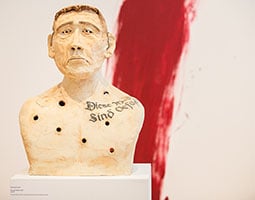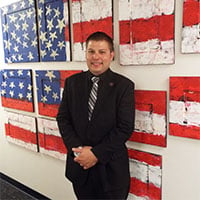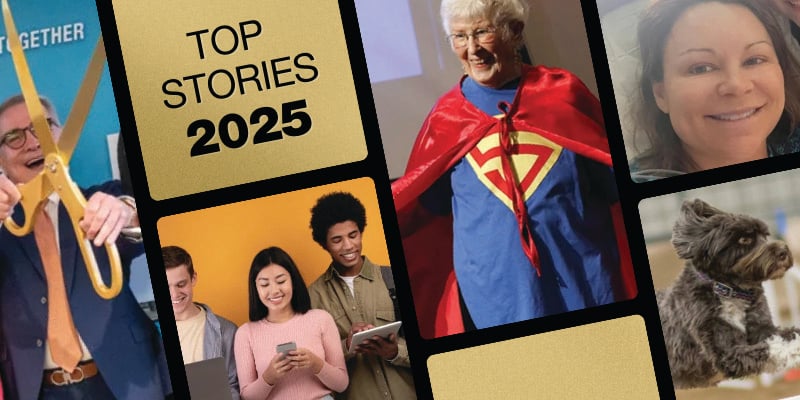The first-ever Partnerships for Veteran & Military Health virtual conference is scheduled for April 23 – 24, 2021. With an emphasis on Inspiring a Community of Care and Connections, the conference includes nationally known speakers, panel discussions on topics ranging from PTSD to suicide awareness/prevention, and poster presentations. Sponsored by MDC/Richmond American Foundation and hosted by the University of Colorado College of Nursing and the Skaggs School of Pharmacy, the conference is designed to offer an exchange of knowledge and sharing of experiences that enable attendees to improve the care and assistance provided to veterans and military service members and their families. This year’s conference is dedicated to Patrick Browne, one of the chief organizers of the event, who recently passed away.
Military veterans and those who take care of them have unique challenges including adjusting to civilian life after service or deployment, trauma, loss, and/or traumatic brain injury. This conference addresses those needs and provides resources for this group, as well as the general public. “As a nation, we are recovering from a year-long public health crisis and several mass shootings, which has taken its toll on our health and psyche. It’s as if we’ve been under siege for an entire year and some of us are experiencing an overload of stress,” said organizer and CU Nursing Associate Professor Lori Trego, PhD, CNM, FAAN. The organizers believe that everyone can learn something from the event, especially and in light of COVID-19.
“Our speakers are a must-see and hear,” said Trego. “Inspiring and empowering, their personal stories are so motivational and relatable that they have something that resonates with anyone.”
Personal stories empower and inspire
The lineup is impressive, including US Army Gulf War Veteran and Paralympic Silver medalist John Register, and US Marine Combat Veteran and co-founder of CreatiVets Richard Casper, who have channeled their experiences in and out of combat to make a difference in their own and others’ lives.
For Casper, his journey began after suffering a traumatic brain injury in Iraq when he was hit by four IEDs in a matter of four months. Upon returning home, he found it hard to adjust and suffered from Post Traumatic Stress (PTS) until he discovered the healing power of art and music.
Growing up in a small farming town in Illinois, he had little exposure to the arts and initially thought, “This isn’t something I can do and how’s it going to help me?” Struggling with trying to learn technical skills, “I was close to giving up and thought about killing myself.”
 Art by Zachary Burgart, military veteran and Creativets participant. Art by Zachary Burgart, military veteran and Creativets participant.‘Damaged Within’ 2017 36x24x12” Ceramic and acrylic paint Reflecting on this piece I made four years ago, and the work I have made since, I see more in it. I made this piece as a self-portrait. This was how I viewed myself. Strong. Capable. Determined. Scarred. Scared. The outside of the bust is muscular, worn and stoic while the interior is soft, brittle, and damaged. I wrote names on the inside of the bust in the chest cavity while I waited for the clay to dry to build higher. I wrote names of friends who were killed in the dangers of combat. I wrote names of friends who killed themselves after combat in the safety of their own homes. I wrote things I was afraid to tell anyone. Things that I was battling. Things I wanted to tackle, wanted to talk about, but there wasn’t a voice for me. This bust provided that voice. The holes in the chest represent platoonmates who were killed on my 2006 Iraq deployment with 3rd Recon Battalion. By looking into the holes you’re able to read my thoughts, the names and the fears I wasn’t able to speak about. My work now, 4 years later, deals with the same aspects that this bust spurred. Hard exteriors, soft interiors. Fear of loss. Fear of suicide. Fear of memories. |
Moving from “warrior brain to artist brain”
Full of skepticism, Casper enrolled at a community college and started writing stories and creating art where he discovered how to harness the artist within him and move from “warrior brain to artist brain.” It was so powerful that he co-founded CreatiVets in 2013 to help other veterans who are suffering. “I had a hard time putting my feelings into words. I didn’t feel comfortable telling anyone my problems. I found a way to talk about it without talking about it,” said Casper, who now lives in Nashville. “I dove into art because I felt like it was healing me at that moment.” According to Casper, art was non-threatening and helped him repurpose his memory.
Non-threatening outlet helps veterans adjust and cope
CreatiVets helps veterans heal through free music and art programs. But it’s not art therapy. The program is two-fold. One track flies veterans to Nashville where they work with some of the best songwriters in the country to put their feelings into words; the second allows veterans to immerse themselves and study for three weeks at one of the best art schools in the country. The idea behind the nonprofit is to give veterans an outlet to open up about their experiences and cope with their war-related trauma. So far, the nonprofit has helped close to 600 people through all of its programs. “Our programs make art attainable and teach those we have helped to empower themselves. They remap the way they think of negative situations,” said Casper.
Similar to Casper, world-class athlete and Desert Shield and Desert Storm veteran John Register had to undergo a shift in mindset. His turning point came in 1994 when he was training for his third Olympic trials. Participating in the Army’s World Class Athlete Program, winning nine gold medals in the Armed Services Competition, and two World Military Championship, and having qualified in 1988 and 1992 in the 110m hurdles and 400m hurdles respectively, he seemed destined to compete as a member of the 1996 Olympic Team.
Life-changing injury shifts mindset
Unfortunately, during training, he experienced a life-changing injury that sent him on a journey of discovery. While practicing, he miss-stepped a hurdle and landed awkwardly. The injury caused an arterial blockage in his left leg which cut off the blood supply. “My leg started to die,” said Register. The doctors told him he’d never run normally again. Hoping for a better quality of life, he chose to amputate. “The pain spoke first. Get rid of the leg. Get rid of the pain,”
That was the beginning of his new normal mindset. He was at a low point. His dreams were shattered. His wife told him they would get through it. Her support helped give him a platform. “When truth outweighs fear, we commit to a courageous life,” Register said. Post-amputation, he began swimming for physical therapy, re-sparking a competitiveness that he thought he had lost. “I did not overcome the loss of my limb. To overcome the loss would mean I’d have to grow it back. What I overcame were the limits I placed on myself and that others placed on me. This is what is universal for all of us to overcome.”
Applying life lessons and focusing on what’s possible
Register’s life has come full circle in his transformation from All-American long jumper to Paralympic Silver medalist. His experience led him to found Inspired Communications International, where he serves as a motivational/inspirational speaker, helping audiences amputate fear and apply life lessons learned through time of testing to focus on what's possible. His keynote, "Amputate Fear: Embrace the New Normal Mindset" challenges audiences to unleash the inspiration in them.
Like many, Casper and Register have struggled. The two have, however, been able to direct their challenges into something positive and have chosen to share the lessons they have learned to help veterans and the general public who are suffering. “One thing we all need in life is empowerment,” said Casper.
 Patrick Browne Excerpt from Patrick Browne’s Tribute Archive Patrick was a husband, friend, son, brother, cousin, nephew and son-in-law. He was a classic rock and hip hop music lover, keen golfer, supreme puzzle solver, lover of Lego, avid Denver Broncos fan, world traveler and dedicated devourer of his wife Rachel’s home cooked meals. His house and arms were always open to newcomers; he thrived on ensuring others were having a good time. His sense of humor was a source of light and laughter for many who got to know him. After Patrick was honorably discharged from the Army in July 2005, he returned to Denver and decided that he needed to invest in his future. In 2006, he enrolled in the Community College of Denver where he earned his Associate's Degree. He continued on in his studies at the University of Colorado Denver where he graduated in 2010 with his BSBA with an emphasis in Management and Human Resources. After his college graduation, Patrick worked in Human Resources as well as working with disabled Veterans with the State of Colorado, but found his true calling when he returned to University of Colorado Denver in the office of Veteran and Military Student Services, where he spent the next ten years pursuing his true passion; serving veterans and their families. Patrick was a natural leader. |
CU Nursing – a commitment to caring for our service members, veterans and the community
CU Nursing is committed and engaged in caring for our service members and veterans, starting the first Master of Science and Doctoral degree programs in Veteran and Military Health Care for our nurses and other health care providers to really understand these underlying issues, service-connected conditions, and ways to improve the systems of care. Our nurses are already making a difference – touching greater than half a million veterans in just the last few years. Out of the VMHC Area of Excellence that has brought together many community partners, CU Nursing will be launching a Consortium for Veteran and Military Health to continue this engagement, fostering research, and disseminating scholarship.
For more information and to register for the Partnership for Veteran and Military Health Conference, visit https://cucon.regfox.com/vmh2021. If you are a veteran or a military service member, a family member, or caregiver and need financial assistance to attend, contact Ann Froese-Fretz or Karen Mellis. This year's conference is dedicated to Patrick Browne, Director of Veteran and Military Student Services at CU.
Thank you to the following organizations who have helped make the conference possible:
- The University of Colorado Helen and Arthur E. Johnson Depression Center
- The University of Denver, Graduate School of Professional Psychology/Military Psychology
- The Steven A. Cohen Military Family Clinic at the University of Colorado Anschutz Medical Campus
- The University of Colorado Marcus Institute for Brain Health
- The Rocky Mountain MIRECC Suicide Prevention Program
- Community Partners, Seeking the Military Suicide Solution Podcast #VeteranMentalHealth



